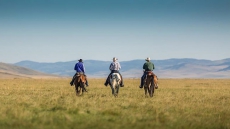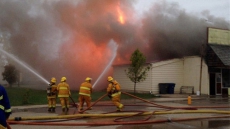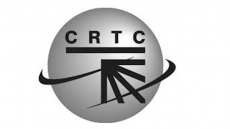OTTAWA - Should Canada's first Ebola case ever present itself, public health officials will be faced with a daunting challenge: tracking down everyone the patient had contact with in order to contain the spread of the virus.
In medical circles, it's known as contact tracing. It involves a bit of detective work as health-care workers try to piece together the events leading up to the moment a patient with an infectious disease arrived at the hospital.
There are no confirmed cases of Ebola in Canada, and as of last week public health officials have not done any contact tracing on any of the suspected cases because none of them were considered all that likely to have the virus.
"None of them have been high suspected of Ebola," Dr. Gregory Taylor, Canada's chief public health officer, said last week. "If we had a high suspect of Ebola ... we would start doing contact tracing."
But what happens if Canada's first case of Ebola walks through the door?
It starts with a diagnosis. Doctors need to know what they're dealing with in order to know how the disease is spread.
Ebola is transmitted through bodily fluids. That means anyone who has come into contact with a patient's blood, vomit or other fluids needs to be identified.
"You are basically trying to put together the pieces of where someone has been," said Dr. Bryna Warshawsky, a public health physician for Public Health Ontario.
Nurses and hospital staff would be a logical place to start. Who saw the patient when he or she arrived at the hospital? Did they have any contact with the patient's bodily fluids? If so, there's a chance they could also be infected, so they would be monitored for symptoms of the virus and asked to take their temperature twice a day for three weeks.
If the patient is conscious, he or she is interviewed, sometimes several times. The patient would be asked when they started feeling ill, where they've been and with whom they've had contact.
The patient will also likely be asked to provide contact information for those people as officials begin the painstaking task of tracing their contacts.
Contact tracing works best in the early stages of an outbreak, when there is just one case or a small number of cases, said Dr. Mark Loeb, an infectious disease expert at McMaster University in Hamilton.
"It really depends on what's happening and you have to look at the situation, you have to see how big is the outbreak," he said in an interview.
"It works best when you can actually clearly define who the infected individuals are, and then you have a good — or at least a reasonable — chance to look at the individuals who are exposed."
One of the first things Loeb did after a suspected Ebola patient arrived at a Hamilton hospital 13 years ago was try to retrace the man's steps to determine how many other people may have been exposed to the virus.
The first step was easy. Loeb and his team drew up a list of hospital staff who had come into contact with the patient, who, it later turned out, was not actually infected with the Ebola virus.
"For us, that was the easy part. We could look at the staff and say, 'OK, these staff, they're going to get their temperature monitored,'" Loeb said.
"The tricky part was from the laboratory, because there had been laboratory staff who might have been exposed to blood, and to trace them was very, very difficult."
The next step usually involves hospital staff or the local public health authority making phone calls to everyone who may have come into contact with the patient.
"Once somebody is definitively diagnosed with that, it's a series of concentric rings," Taylor said.
Close contacts could be health-care workers, family members, funeral workers, anyone who has had contact with contaminated surfaces or equipment or laboratory workers who handled specimens from confirmed or probable Ebola cases, according to the Public Health Agency of Canada's latest guidelines for health professionals.
The agency does not recommend putting close contacts into quarantine in the event of a confirmed or probable Ebola case.
Instead, they are closely monitored by public health staff for fever or other symptoms for 21 days. They're also advised not to travel to any other cities or towns during the monitoring period.
The odds of the disease spreading diminish as the circle widens, Taylor said.
"As you gradually move out, the reason you conceptualize this ring is the risk gets smaller and smaller and smaller."





